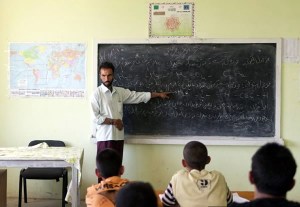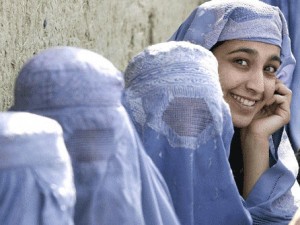The paper discusses the marginalization of the women in Provincial Peace Committee as a result of the institutional Rules. The rules are made by the Male dominated Government in Afghanistan have made it difficult for women to be heard. This paper aims to throw insight on the problems caused by the institutional rules which lead to the exclusion of women in the Provincial Peace Committee of Herat Province in Afghanistan.
I. Introduction
A whole generation of Afghanistan (1978-2013) including 50 % women never experienced the true meaning of peace in their country. Setting up a Peace Council in order to maintain peace and stability throughout Afghanistan and to broker peace with the Taliban seemed to the best of ideas. (APRP 2011) The Afghan High Peace Council (HPC) appointed by President Hamid Karzai is the highest body in the peace and reintegration process in Afghanistan (Gossman 2011). HPC is divided into the branches at the subnational level known as the Provincial Peace Committees (PPC) (APRP 2011). Each PPC establishes guidelines for the provincial government to reintegrate ‘low level’ fighters into local communities, provides financial incentives and job programs to lure fighters away from the Taliban.
The PPC of Herat Province was established in June 2011. The number of each PPC members is related to the population of the province. Herat Provincial Peace Committee has 30 members out of which 3 are women. The Herat government counts these three particular women as great contributors to the peace-building process in Afghanistan and makes extensive attempts to encourage them to speak out and take part in decision-making in the peace building. (Bashir 2013) However, the women in the Herat PPC tend to be marginalized and their ideas are being neglected since they are in a minority and male members of the committee appear to resist considering their¬ ideas (Darwazian 2013). On the one hand, cultural norms and on the other hand the institutional rules of the High Peace Council are the essential factors that lead to the neglect of women’s ideas.
This paper aims to gain insight on the Institutional factors which contribute to the exclusion of women in the PPC. It attempts to look at the institutional rules of the High Peace Council and the Provincial Peace Committee listed in the Peace Guideline designed by the Afghanistan Peace and Reintegration Program (APRP).
II. Women’s Exclusion through the Institutional Rules
One of the factors behind the marginalization of women in the Provincial Peace Committee of Herat Province is the institutional rules. It is a fact that the rules are made by the Afghan men whose minds are affected by the Taliban thoughts. The paper analyzes the exclusionary practices which are originated from four institutional factors: written rules and regulations of the PPC and HPC, the structure of the PPC, the appointment and recruitment process and the negative effects of quota in PPC.
1. Exclusion in the Text of the PPC and HPC Laws
In a sharp glance through the articles and clauses pointed out in the PPC guidelines, it can be observed that the exclusion of women rises right from the texts of law containing the rules and regulations of the PPC. To support this idea, the paper analyzes the 6th Clause of the Guidelines for the roles and responsibilities of Provincial Peace Committees which reads:
“The members of Afghan High Peace Council and its committees at subnational level shall include former warlords (Jehadi, Talib, etc.), religious teachers, ethical leaders, respected elders, civil society representatives, government officials and women.” (APRP 2011, P5)
It is not common in Afghanistan to have former female war lords, female religious teachers or female ethical leaders, but respected elders, civil society representatives and government official can be female. The above quote gives a feeling to the reader as if women are only being there because of their femininity. The term ‘Women’ is conspicuous because the text contains a list of positions (civil society representatives for instance) and roles in society, not the word ‘men’, but by including ‘women’ at the end, it is clear the policy document assumes that women cannot be and are not religious and ethical leaders, respected elders, civil society representatives or government officials. It implies: 1.Women are not all these. 2. They are nothing BUT women.
Darwazian (2013) presumes it is unacceptable for the people in the Peace Council who make the law to count women as their equal partners; instead they usually distinguish women not by the position they have in the society but by their gender.
2. Exclusion through the Structure of the Provincial Peace Committee
The Provincial Peace Committees operate in the provinces. They are tasked with devising a framework for talks with the Taliban and inviting them to join the Afghan community upon accepting the conditions being listed by the High Peace Council. Peace Council and Peace Committee together come under a program called Peace Program. The head of the PPC is usually a Mullah (religious teacher), the rest of the members are being appointed having the conditions stated in the Guidelines for the roles and responsibilities of Provincial Peace Committees. Based on the gender quota the minimum number of female members should be 3. According to the rules made by the Peace criteria for joining Peace Council as a member are as follows: (i) the person should be known by the society for his/her good works and behavior. (ii) He/she should be an influential person in the province. (iii) The applicant should be a religious teacher, a former warrior, a representative of civil society, a government official.
Herat Province, having 15 districts, has 30 members in the PPC. Based on the rules and regulation of the Peace Program in the sub-national level run by the Provincial Peace Committees, the Head of the Provincial Peace Committee in each province shall be a religious leader (APRP 2011, P4). This rule has made it difficult for the women to be in charge of the PPC, because women cannot be considered as the religious leaders in a traditional province such as Herat. The rest of the members are being appointed by the head of the PPC if they meet the criteria required for the membership. Based on the gender quota the minimum number of female members should be 10% i.e.3 in Herat PPC. One of the members should be the Director of Women Affairs. Without considering her interest, she has to be one of the members of the PPC. This is where the problem lies; she can barely attend 5% of the meetings due to the several meetings and the full time job she already has. There are many cases in the directorate of women affair that she should consider and work upon them. This makes her a non-present and ineffective member. Perhaps she is at faults for not attending something which is essential (Peace building).
Subcommittee formation
In spite of being minority in the Provincial Peace Committee, women in the PPC cannot enjoy being the majority at least in one section of the PPC. There are 6 subcommittees operating within the PPC: (i) The Economic Development Committee, (ii) The Conflict resolution Committee, (iii) The Public Relation Committee, (iv) The Public Awareness Committee, and (v) The Prisoners’ Visitors Committee.
The members are being divided into the 5 committees based on the decision of the head of the PPC. The women are always being put in separate subcommittees. Darwazian (2013) points out the female members have asked to be put up in one committee, however, their request was rejected by the PPC. The response they got was that due to the rules of the PPC, gender balance should be maintained in each subcommittee. (Darwazian 2013) The PPC believes it is maintaining of the gender balance if they have at least one women in three committees, however, by doing so those three women are not only sidelined in the whole PPC but they are a minority in each committee too.
3. Exclusion through Appointment in the Provincial Peace Committee
3.1. The Recruitment Process
The other section through which women are being sidelined is the recruitment process. The Provincial Peace Committee recruits members who meet the criteria listed in the rules designed by Afghanistan Peace and Reintegration Program. The minimum number of women being the members of PPC is three which is ordered by the HPC. However the PPC officials try not to recruit more women once they reach to the minimum number. In spite of the great possibility for more women to join the PPC, the rules affected by patriarchy within the peace committee bring about the obstacles for the applicants. Darwizian argues that the there are many active women applicants who meet the criteria but it is strange when during the selection process PPC announces that no eligible female applicant is shortlisted (Darwazian 2013). She adds ignoring the applications of the empowered women who want to be a member is a big challenge. According to her there is no higher authority in the province so they go and complain for not being recruited. Therefore since there is no punishment, no follow up takes place from the female applicants.
3.2. Token Women
Limitation on the minimum number of female members has made it difficult for the women to fully participate in the peace-building process within the PPC. The women are seemed to be symbolic. The international Community emphasizes on the activation of women in the HPC and PPCs. That is the reason why the number of women recruited in these committees by the PPC officials seems to be only a way for creating a false appearance of women’s inclusiveness. Having women as members in the in the Peace Council and Provincial Peace Committees is only to fulfill the condition of international community. NATO, ISAF, UN and other agencies who provides fund to the Peace Committees to develop projects (APRP 2011), want the presence of women in the projects and decision makings in order to give the fund. Golalai Noor Safi one of the female members of the High Peace Council urges on keeping the role of women active in the HPC.
“We are trying to be involved in the peace process but [sic] in my opinion, most of the time we are not included in major discussions… Our mission is to figure out how to keep the role of women active in the High Peace Council and not have our presence serve only as a statistic. (Safi 2012.)”
4. Effective or non-effective Quota
According to the Womenwatch report (2005, p.15) quotas have been an effective tool to increase women’s participation in a country’s decision-making, based on the statistic provided, 80% of the countries that have reached the target of 30 percent women in national legislatures use some type of quota. Sometimes quotas are met with great hope by women as they get guaranteed reserved seats. Securing ¼ of the Afghan Parliament seats by Afghan Women is one of the advantages of the quota. However this has not always been in the favor of women especially with the three women in the Herat Provincial Peace Committee. As discussed above, three seats are allocated for the women in the PPC but these 3 seats are counted as the minimum number not maximum. However when the number of female members in the committee reaches to three, the PPC authorities assume no more woman can be hired. They take this number as the maximum number allocated for the women. The obscurity of law or men with the patriarchal minds, who do not want to see more women around them in a working place, can be the main root of the problem. Norris (2000) discusses that the implementation of Gender Quotas depends on many different factors including how the quota is understood and has been put into practice.
The other problem with the quota rises when we take the example of Director of Women Affairs who automatically becomes a member of PPC without considering her interest toward Peace-building processes. The lack of time and lack of interest in attending meeting make her not to pay enough attention to a serious matter and not to be present in any of the meetings conducted by the PPC. Therefore, if this position was not automatic, instead of her another interested woman who could be more active in attending PPC sessions could soon replace her, but this is the PPC law that provides this.
III. Women Exclusion from the Peace Building Process through PPC
One of the origins of the women exclusion in the Provincial Peace Committee of Herat province view is the Institutional Rules. The smell of patriarchy and the obscurity in the text of law, the misunderstanding of Gender Quota and its negative effects, the lack of transparency in the recruitment process and disobedient from the HPC are glass ceilings which prevent women from being heard. Lack of punishment made it difficult for women to complain, hence, there is no follow up to check the women activation in the peace-building process.
IV. Conclusion
Although in today’s Afghanistan women make up one-quarter of parliament, they fill one-third of the nation’s schools and universities but they are being marginalized in almost all public issues. The peace process run by the High Peace Council brings about the same challenges to its female members. Women being sidelined and not being heard in the Provincial Peace Committees is the issue discussed in this paper. The exclusionary practices against women are seems to be due to the institutional rules and the way they are implemented in the country. The institutional rules of the High Peace Council and the rules made and applied by the Provincial Peace Council in Herat is one of the origin of neglecting women in the peace-building process through the PPC. Starting from the text of law, women can be seen as another category of people classified into another group because of their femininity. The law addresses the members of PPC with the job they have in the society, but it takes the name of women as if they cannot be employed to be titled by one of the mentioned positions. Simultaneously the exclusion practice can be observed in the structure of the PPC and the formations of the committee within the PPC. The three women cannot be given the chance to be the majority even in one subcommittee. Women remain as a minority because from one hand the lack of transparency in the recruitment and membership process makes it difficult for women to increase their number, and from the other hand the Quota which set 3 as the minimum number of women as members of PPC is considered as
a maximum number.
Hereby, the meaningful participation by women in the peace process is jeopardized by the fact that there are only 3 women in the 30-member Provincial Peace Council and it is difficult for them to be a majority since the institutional rules are the big barrier to the achievement of such goal.
Bibliography:
Afghanistan Peace and Reintegration Program, 2011. Rahnamood Naqsh wa Masooliathaye Committe haye walayati Solh [Guidelines for the roles and responsibilities of Provincial Peace Committees] Available form: Online http://www.hpc.org.af/dari/index.php/2011-04-08-11-39-49/2011-04-11-04-45-06/64-2011-07-04-05-27-45
Darwazian, J,. 2013. Zanan E Afghan Qodrat Syasi Nadarand [Afghan Women Do Not Have Political Power], Open Asia, Armansharh, 09, 1-3. Available Form: Online http://openasia.org/item/5670 [Accessed: August 2013]
Equal Participation of Women and Men in Decision-Making Processes 2005. With Particular Emphasis on Political Participation and Leadership Report of the Expert Group Meeting Addis-Ababa, Ethiopia 24 – 27. Available Form: Online http://www.un.org/womenwatch/daw/egm/eql-men/FinalReport.pdf [Accessed: August 2013]
Gossman, P., 2011, Afghan High Peace Council Fails to Reflect Afghan Civil Society, Peace Brief 74. Available Form: Online http://permanent.access.gpo.gov/gpo36577/PB74-Afghan-High-Peace-Council-Fails-to-Reflect-Afghan-Civil-Society.pdf [Accessed: August 2013]
Norris, P,. 2000. Increasing Women’s Representation in Government: What strategies would work best for Afghanistan? New York. Available form: Online http://www.hks.harvard.edu/fs/pnorris/Acrobat/Afghanistan.pdf [Accessed: August 2013]
Safi, N., Women on Afghan peace council say they are sidelined, Reuters, 22 March 2012. Available ForOnline http://www.reuters.com/article/2012/03/22/us-afghanistan-women-idUSBRE82L0FP20120322 [Accessed: August 2013]
Yamin, S., 2008. Peace Building in Afghanistan: Revising the Global War on Terrorism. Regional Center for Strategic Studies,. Available from: http://www.rcss.org/publication/policy_paper/Policy43.pdf [Accessed: August 2013]


